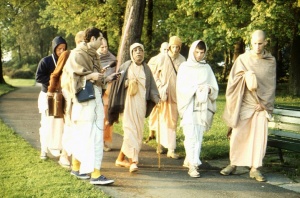CC Adi 17.100 (1975)

A.C. Bhaktivedanta Swami Prabhupada
Below is the 1996 edition text, ready to be substituted with the 1975 one using the compile form.
TEXT 100
- maheśa-āveśa hailā śacīra nandana
- tāra skandhe caḍi nṛtya kaila bahu-kṣaṇa
SYNONYMS
maheśa-āveśa—in the mood of Lord Śiva; hailā—became; śacīra—of mother Śacī; nandana—son; tāra skandhe—on his shoulder; caḍi—getting on; nṛtya—dance; kaila—did; bahu-kṣaṇa—for a long time.
TRANSLATION
Then Lord Caitanya, adopting the mood of Lord Śiva, got on the man’s shoulders, and thus they danced together for a long time.
PURPORT
Lord Caitanya Mahāprabhu adopted the mood of Lord Śiva, for He is Śiva also. According to the philosophy of acintya-bhedābheda-tattva, Lord Śiva is not different from Lord Viṣṇu, but still Lord Śiva is not Lord Viṣṇu, just as yogurt is nothing but milk and yet is not milk nevertheless. One cannot get the benefit of milk by drinking yogurt. Similarly, one cannot get salvation by worshiping Lord Śiva. If one wants salvation, one must worship Lord Viṣṇu. This is confirmed in the Bhagavad-gītā (BG 9.4): mat-sthāni sarva-bhūtāni na cāhaṁ teṣv avasthitaḥ. Everything is resting on the Lord, for everything is His energy, yet He is not everywhere. Lord Caitanya’s adopting the mood of Lord Śiva is not extraordinary, but one should not therefore think that by worshiping Lord Śiva one is worshiping Lord Caitanya. That would be a mistake.